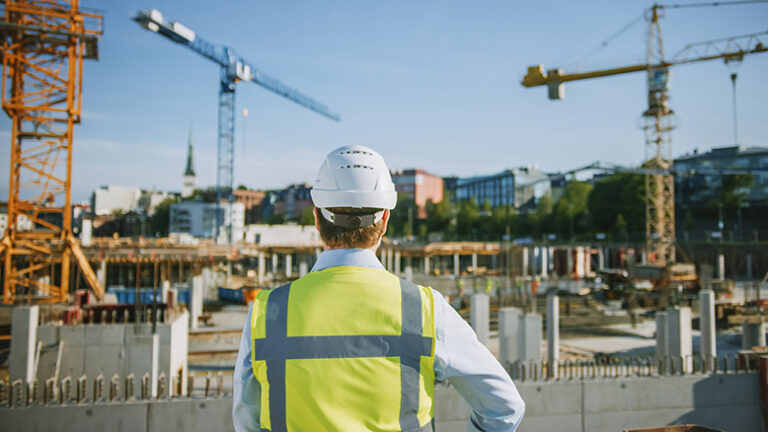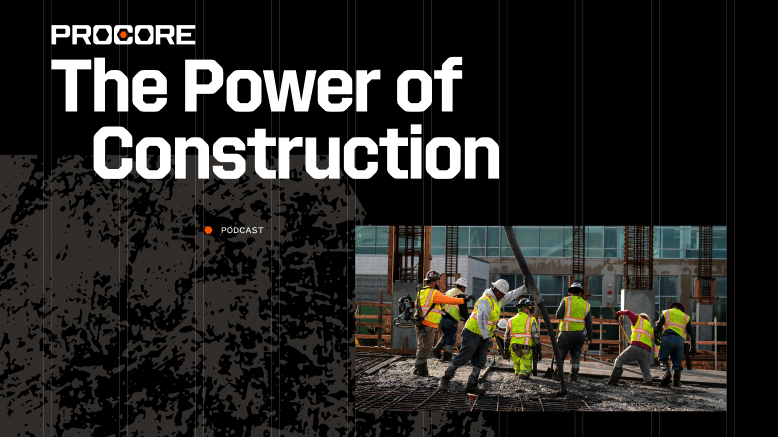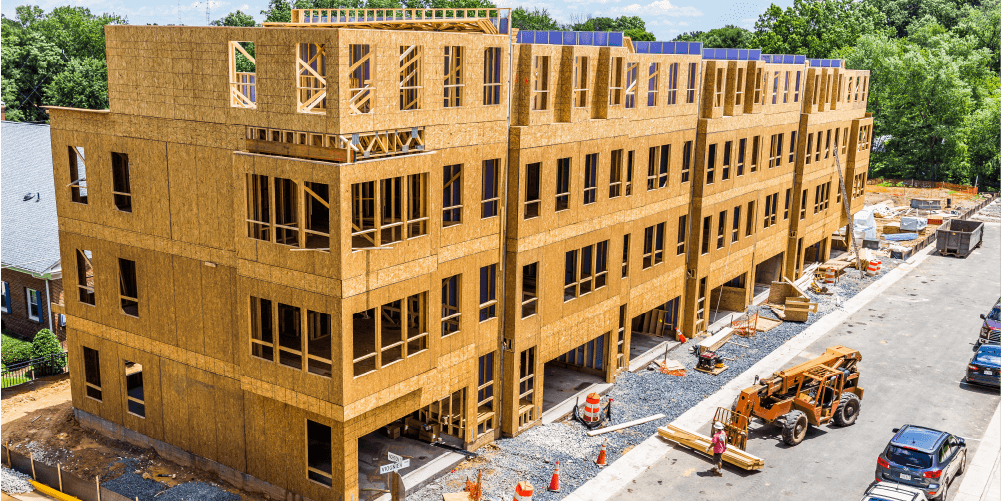— 6 min read
Commercial Construction Management: Mastering the Basics

Last Updated May 6, 2025

Kristen Frisa
Contributing Writer
113 articles
Kristen Frisa is a contributing writer for Procore. She also contributes to a variety of industry publications as a freelance writer focused on finance and construction technology. Kristen holds a Bachelor of Arts in Philosophy and History from Western University, with a post-graduate certificate in journalism from Sheridan College. She lives in Ontario, Canada.
Last Updated May 6, 2025

Commercial construction management is no small feat: Commercial projects tend to be large and complex, and unlike residential construction, which involves repeatable tasks, can involve industry-specific and technical aspects.
Commercial projects are a key part of creating functioning communities as they comprise the offices, manufacturing plants, hospitals, hotels and shopping centers central to modern life. Because of how varied these projects can be, construction managers need tried and true systems to help organize their projects, open up lines of communication and collect and analyze project data so they can improve their processes to get the best possible results.
Table of contents
What is commercial construction management?
Commercial construction projects are those that build businesses and institutions. Commercial construction management involves all the activities necessary to support commercial projects from planning and design, through execution and closeout, including budgeting, scheduling and compliance.
Commercial construction management is different from residential construction, as it tends to involve big budgets, large teams, longer timelines and stricter regulations.
Some of the key parts of managing a commercial project include:
Planning and Design
The process begins with collaboration between architects and designers to create plans that fulfill client requirements and comply with local regulations. Construction managers work with engineers, architects and owners to plan the project and develop its specifications.
Cost Management
Construction managers keep track of schedules and budgets, flagging any cost overruns and making sure resources are used effectively through the construction process.
Contract Management
Managing contracts involves ensuring adherence to agreements and mitigating potential legal issues through careful oversight.
Quality Control
Construction managers oversee regular inspections and audits to make sure the project meets quality standards and maintains regulatory compliance.
Risk Management
Effective management involves recognizing risks to project completion, from weather to contractor failure, and seeks to mitigate those risks with early recognition and mitigation strategies so that the project can be successfully completed.
Communication
Construction managers work to keep dialogue going between the different stakeholders, to minimize mistakes and build trust. Regular meetings, central and organized messaging protocols, shared documentation and ongoing updates between all parties are all part of effective communication.
Unique Challenges in Commercial Projects
Commercial projects differ from residential ones in their complexity — because the buildings are used for businesses or institutions, they tend to be larger and involve intricate designs, so they require significant advanced planning.
In many cases, commercial projects also involve a larger number of stakeholders, including architects, engineers, contractors, subcontractors and clients. Each party brings specific expertise and requirements, so managers have to integrate their roles carefully and facilitate open communication to avoid errors and improve efficiency.
Regulatory compliance is another significant hurdle; commercial projects must adhere to local, state and federal regulations, which can vary significantly depending on the project location. This includes zoning laws, environmental regulations and building codes that must be meticulously followed.
A good example of the more rigorous building standards that apply to commercial buildings is that while individual residential homes are often timber-framed, commercial buildings are often built with concrete and reinforced with steel.
On top of these challenges, commercial projects typically face tighter timelines and budget constraints, increasing the pressure to efficiently allocate resources and manage time.
7 Best Practices for Effective Commercial Construction Management
Following these best practices, along with considering sustainable building methods, can lead to better project outcomes.
1. Choose the right project delivery method.
The choice of project delivery method can significantly impact the construction manager's role, as well as the expectations for the project’s timeline, cost, risk allocation and the way stakeholders work together to reach common goals.
For example, construction managers may find there’s little communication between design and construction teams on design-bid-build projects, whereas open and frequent communications may be expected on design-build projects. Construction managers should fully understand the expectations of the project delivery method to work effectively within its framework.
2. Conduct thorough planning.
Commercial construction managers should be careful not to rush the planning process. Due diligence in the early stages, including detailed site analysis, feasibility studies and plenty of collaboration with architects and engineers can go a long way to mitigating risks, setting realistic project goals and reaching performance targets.
3. Practice careful cost management.
Accurate budgeting and continuous financial tracking are important to preventing cost overruns. This includes detailed cost estimation, regular budget reviews and implementing cost-saving measures without compromising quality. Tools like project management software can provide real-time financial insights to facilitate better decision-making.
4. Set standards for document control.
As teams grow, it becomes even more important that everyone stays up to date on any project changes. However, greater complexity means there’s more paperwork to keep track of, including documents, change orders, compliance sheets and permits. Strict adherence to set document control standards can make sure the latest documents are widely accessible when they’re needed, establishing a single source of truth and avoiding costly mistakes.
5. Stay safe and compliant.
Staying compliant can be a huge job, but it’s hard to overstate its importance for commercial construction projects. Making and adhering to strong safety protocols can protect workers and maintain project integrity. Create and implement safety plans, keep careful track of safety records and make sure all employees stay up to date on training to stick to safety rules.
Compliance can be a lot to manage, but construction management software can help keep managers up to date on any shifting guidelines or employee training deadlines.
6. Prioritize risk management.
There are always risks to construction projects — in any large, coordinated effort, there’s a chance that something will happen to threaten the outcome of the whole. For construction, those risks could look like large weather events, owner changes, unexpected site conditions, labor or material supply disruption or many other factors. Commercial construction managers can use experience and project data analysis to map out the potential risks on any project and develop plans for next steps in the event any one of them comes up.
Technology can help in several facets of risk management: first, it can help collect, organize and analyze data from projects to make best predictions of the risks that may arise. Once a project begins, project management software can help identify any deviation from project plans quickly, so that managers can put next steps into play.
7. Harness the power of technology.
Modern technology plays an increasingly significant role in managing construction projects. Software solutions for scheduling, budgeting and communication streamline operations and improve efficiency. Building Information Modeling (BIM) particularly aids in visualizing projects and addressing potential problems early in the process.
Emerging technologies like artificial intelligence and drones are becoming increasingly prevalent among construction managers. The key to competitiveness and long-term success may lie in the strategic use of these technologies as they grow in scale and scope.
Stay updated on what’s happening in construction.
Subscribe to Blueprint, Procore’s free construction newsletter, to get content from industry experts delivered straight to your inbox.

Managing all the Variables
Commercial construction projects are often large, complex and span a longer time period than residential construction. Managing all the pieces of such involved projects involves navigating a complex landscape of planning, design, execution and regulation. By understanding the fundamentals, leveraging technology and following best practices, industry professionals can effectively manage these projects and achieve successful outcomes. Staying informed, embracing technology and keeping communication open can help commercial construction managers navigate project success.
Was this article helpful?
Thank you for your submission.
0%
0%
You voted that this article was . Was this a mistake? If so, change your vote
Scroll less, learn more about construction.
Subscribe to The Blueprint, Procore’s construction newsletter, to get content from industry experts delivered straight to your inbox.
By clicking this button, you agree to our Privacy Notice and Terms of Service.
Thank you!
You’re signed up to receive The Blueprint newsletter from Procore. You can unsubscribe at any time.
Categories:
Commercial Construction, Construction Management, Project Management
Written by

Kristen Frisa
Contributing Writer | Procore
113 articles
Kristen Frisa is a contributing writer for Procore. She also contributes to a variety of industry publications as a freelance writer focused on finance and construction technology. Kristen holds a Bachelor of Arts in Philosophy and History from Western University, with a post-graduate certificate in journalism from Sheridan College. She lives in Ontario, Canada.
View profileExplore more helpful resources

What Happens When Data Drives the Business?
Construction has long been seen as a low-margin industry. But what if the real problem isn’t the margins—it’s how decisions get made? In episode 17 of The Power of Construction,...

The Ultimate Guide to Managing Commercial Construction Inspections
Commercial construction projects require ongoing inspections at almost every point of the building process, from checking the site before construction to the final inspection with a local building authority. Understanding...

6 Types of Construction Projects: Key Differences for Owners & Contractors
Construction projects are often categorized based on their scale, the types of structures being built, and the purpose of the project (also called “end use” or “land use”). Broadly, there...

6 Tips to Turn Construction Culture Into Daily Practice
Every construction company has a culture. Whether it’s intentional or not. The difference lies in how that culture shows up on the job. In the first article of this series on...
Free Tools
Calculators
Use our calculators to estimate the cost of construction materials for your next project.
Templates
Find a template to help you with your construction project tasks.
Material Price Tracker
Get the latest U.S. retail prices and view historical trends for common building materials.
Glossary
Explore key terms and phrases used in the industry.
